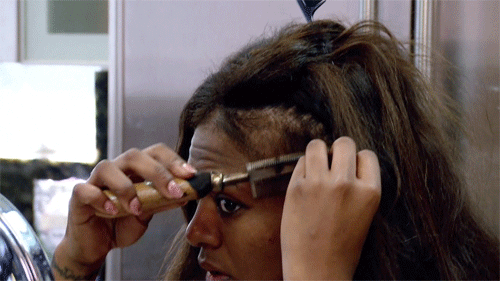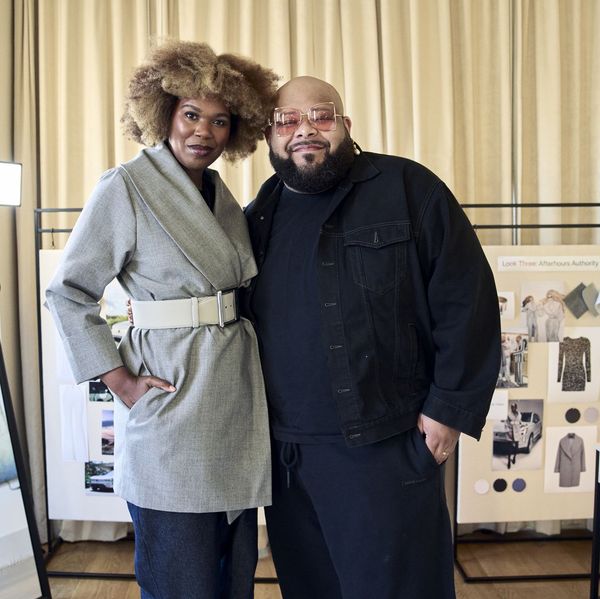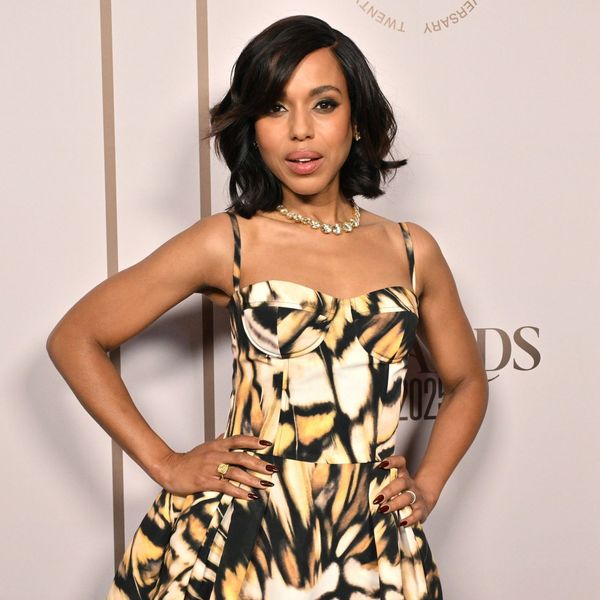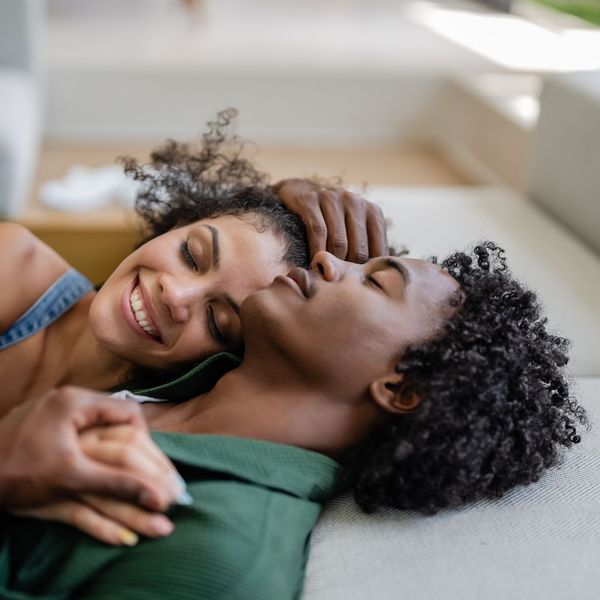
It was several years ago when I realized that I no longer had edges on the left side of my head. I was completely bald with patches of hair, and it looked as awful as I felt. What I was experiencing looked very similar to what Naomi Campbell went through back in 2010.
I cried for weeks after realizing that I was balding, and I felt absolutely powerless.
After a while, I knew that I had to do something to regrow my hair, so I put on my big girl pants, and made a doctors appointment.
Following an examination, my doctor gave me some iron pills and told me to ditch the weaves. After a few months of TLC, and a haircut, my edges were healthier and stronger. But the frightening experience is one I'll never forget.
What I was suffering from, and what Naomi was suffering from in that infamous 2010 photo, is called traction alopecia, and it's not a laughing matter. Many black women suffer from the same medical issue, and there are a number reasons why, including stress and the methods used to care for black hair.
Alopecia is a medical term for hair loss. There are many types of alopecia, but the kinds that impact black women the most are traction alopecia, which happens when the edges of your hair start balding, and alopecia caused by chemical straighteners.
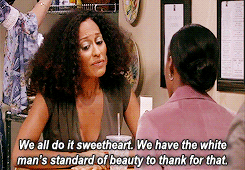 Telling black women to give up braiding their hair, or to stop using chemical relaxers and straighteners, is easier said than done. One reason being is that many employers have imposed unrealistic hair standards on black women, and it has been happening for decades.
Telling black women to give up braiding their hair, or to stop using chemical relaxers and straighteners, is easier said than done. One reason being is that many employers have imposed unrealistic hair standards on black women, and it has been happening for decades.
History proved that as black women followed their employer's hair standards in order to keep getting their checks, they sometimes ended up bald or balding, and what woman really wants that?
HOW EMPLOYERS KILLED BLACK WOMEN'S HAIR
If you look at a black woman with a curly hair texture, you'll notice that her hair naturally grows upward and outward, but a lot of people don't realize that, especially some employers.
Even with minimal education on black hair, some employers still do not feel black women rocking afros, because they see the style as "political," "faddish," or "exaggerated." For instance, back in 2007, a Glamour Magazine editor, who offered some workplace dress code dos and don'ts to a group of black women lawyers, caused a firestorm when she told the group that wearing afros in the workplace was a "big no-no." Lawyer Magazine reported,
An Afro. A real no-no, announced the 'Glamour' editor to the 40 or so lawyers in the room. As for dreadlocks: How truly dreadful! The style maven said it was 'shocking' that some people still think it 'appropriate' to wear those hairstyles at the office. 'No offense,' she sniffed, but those 'political' hairstyles really have to go.
According to Genie, a beautician and hair loss specialist in the Atlanta area who has been treating hair loss for more than three decades, she's seen plenty of black women left out of jobs for not wearing their hair the way it naturally grows. She said that even after the government passed the Civil Rights Act in 1964, which addressed dress code discrimination, black women still had trouble finding jobs because of their hair. So they did what they had to do to get a check, and paid a lot of money to have chemically straightened hair.
"We couldn't get jobs as secretaries, customer service [representatives], cashiers, because we didn't have [our hair] straightened," she said. To help these women, Genie would install capless wigs on her clients, which allowed the scalp to breath, without causing damage to the their hair follicles.
Unfortunately, a lot of women can't wear wigs to some jobs, including service members with jobs that require them to not wear them due to safety hazards. Bobby Spence, a Virginia-basedTrichologist and Hair Loss Specialist, says that military hair standards that require black women to wear slicked ponytails, micro braids, or tight cornrows, are enforced because it allows the service member to put on kevlar helmets, or military-approved headwear. But those hairstyles, coupled with sweat and germs that fall on the scalp while they're working, have been known to completely destroy black hair, which could result in some severe cases of alopecia.
"Being in the military, you have to wear ponytails and keep your hat on," Bobby said. "So think about all the years of putting your hair in a ponytail, all that traction that's going to your temple, and your edges are breaking off every time. That causes hair loss."
But employers aren't completely to blame for hair loss in black women. A lot of hair care techniques for black women are passed down generationally, but what isn't often passed down are proper techniques that keep alopecia in mind.
GENERATIONAL TECHNIQUES AND THE HUSTLE TO GET YOUR DOLLARS
Bobby said that generational hair care techniques are definitely one reason why hair loss is so prevalent among black women. While tight ponytails with barrettes and beads, chemical or heat straighteners, and tight braids, helps black children maintain cute hair styles, it can also cause a lot of damage to it.
He says that when it comes to maintaining healthy hair in children with coarse hair textures, the best thing a mother can do is to let the child's hair grow naturally, or use techniques that do not put too much strain on their hair.
"Think about the average African American woman," he said. "From a child, what happens is is that your hair is really thick, and mom is like, 'Oh I'm going to put a texturizer in their hair to break it down and make it easier to manage.' Okay, well that's where it starts, because you have a chemical now."
Genie and Bobby both said that they've had clients who told them that they've used "kiddie perms"
in their hair because they think that it is more mild than a regular relaxer, but they both disagree with this line of thinking. A chemical is a chemical, and no matter how mild it is, it can still cause hair damage and breakage.
Genie said that she's seen some hair dressers go as far as telling their clients that they're using a kiddie perm in their hair, when they were really using an extra strength chemical relaxer. On purpose. Bobby has seen hair dressers do it, too, and he says that they do it because they want your money. Especially when it comes to using keratin treatments.
"[It's] A way to take your money, and charge you $200-$300 because it's a form of a relaxer," Bobby said. "Anything that takes your coarse hair and makes it straight, it's a chemical. "
The good news is that if you have alopecia, or if you're leery of using chemicals in your hair, there are techniques you can apply to keep it healthy. Celebrity beautician Mushiya Tshikuka, break-out star of WE TV's reality show "Cutting It In The ATL," and owner of The Damn Salon in Atlanta, says that you first have to identify the technique that you're using that's causing your hair loss.
"It's not necessarily the hairstyle, it's the technique," She said. "[For example,] two different people can do box braids, but one is doing it absolutely way too tight, and another one is doing it considering the health of the person's hair. The technique that's used is what's different."
Mushiya says that one great technique to help grow your hair while battling alopecia is to use clip-in hair extensions. She says that one of the reasons why she created Runway Curls, her exclusive line of Ethiopian textured virgin hair extensions, was to help her clients battling hair loss. The clip-in extensions from her hair line, which should be available for purchase within the coming months, can be blended with natural hair without causing too much tension on the hair, while still allowing you to look and feel fabulous.
HOW TO STOP ALOPECIA BEFORE IT STARTS
The best way to keep alopecia at bay is to not put too much tension on your hair, no matter how beautiful the hairstyle is. Bobby recalled a client whose weave hairstyle was so tight that he couldn't help her after her scalp grew bumps that started leaking as a result of the tightness of her braids underneath her weave.
"She called her [stylist] back after she put the weave in, and she said, 'Oh my God...I have such a headache because the weave is so tight, I can't even sleep because it's so tight,'" Bobby recalled. "So the stylist said, 'Don't worry. After a couple of days, it will loosen up a little bit.' After a couple of days it didn't loosen up. Literally, when she came to me...she had puss bumps all over her scalp. I had to refer her to a dermatologist so he could actually treat that condition, because it was even beyond my control."
Genie, Bobby, and Mushiya all suggest that if you are going to wear weaves, make sure that you keep your scalp clean, washed, and moisturized.
"African American hair is very textured and thus prone to dryness," Mushiya said. "Dryness causes breakage... and that stress on the hair will cause alopecia as well. And it's important that women understand that their hair needs to be moisturized, and the best way and first way to moisturize our hair is by using H2O [water]."
Mushiya also suggests that you shampoo your hair more often than once every three weeks or once 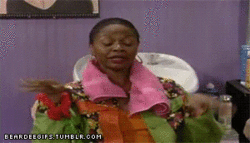
Bobby also says that if you're suffering from hair loss, you should contact a physician before consuming biotin. He says that African Americans naturally have oily skin, and biotin, which is typically prescribed by doctors to help your skin produce more collagen, and it will cause you to suffer from acne.
"I see it all the time," Bobby said. "Seven out of 10 people I see who takes biotin have acne."
He says that if you are looking for a supplement to grow your hair, you should ask your doctor about using sulfur (MSM) supplements instead. He also suggests that you increase your water and healthy food intake."Your hair is made of 16 amino acids. Believe it or not, a lot of those amino acids, you can get through your diet. A lot of those amino acids found in your hair shaft is called l'cysteine. L'cystine if found in things like turkey or a lot of fruits and vegetables. So you can literally feed your hair with the right diet."
Bobby made it clear that weaves and generational hair care techniques aren't totally to blame for alopecia. Besides stress, hair loss in black women may be an indicator of a deeper medical condition.
"When you start see your hair starting to thin out over time, your ponytail didn't have the thickness it once had, your edges are thinning out, it could be because you're having an iron deficiency," Bobby said. "It could be from a hormonal imbalance, it could be a vitamin D deficiency...or a thyroid imbalance...or you could be be pre-diabetic. So there are other things that can affect your hair besides traction and chemical alopecia."
Bobby, Mushiya, and Genie say that if you see your hair thinning, or balding, you should seek professional help immediately. As long as the hair shaft isn't damaged, anyone can recover from alopecia. But if the shaft is damaged, you're pretty much screwed.
If you are suffering from alopecia, there are several other things you should probably keep in mind when it comes to your self esteem. Take a look at those tips in the gallery below.
This Is How To Keep 'Holiday Season Stress' From Infecting Your Relationship
Hmph. Maybe it’s just me, but it seems like there is something really weird happening in the fall season air (because winter doesn’t officially begin until December 21) that cuddle season is in full swing while break-up season is as well. In fact, did you know that break-ups are so popular during the holiday season that December 11 is deemed Break-Up Day?
The reasons why relationships shift around this time vary; however, I did both roll my eyes and chuckle when I read that a very popular one is because it’s an easy way to get out of getting one’s significant other a Christmas present. SMDH.
Anyway, I personally think that the less shallow folks out here may contemplate calling things “quits” or they at least distance themselves a bit from their partner (and what I’m referring to is serious relationships) due to all of the stress and strain that oftentimes comes with the holidays whether it be financial, familial, due to their tight schedules or something else.
Listen, I would hate for you and your man to miss the fun and happiness of experiencing this time of year, all because you are so overwhelmed or irritated that you can’t really enjoy it. That’s why I have a few practical tips for how to avoid allowing the typical holiday season stress from INFECTING your relationship.
Manage Your Expectations
 Giphy
GiphyUnmanaged expectations. If there is a main reason why the holiday season tends to be so stress-filled for so many people, I’d bet good money that this is the cause. And when you’re in a long-term relationship, expectations can manifest themselves in all sorts of cryptic and/or unexpected ways. You might have relatives who assume that you are going to be with them for Thanksgiving or Christmas when you have other plans in mind. You might be thinking that you are going to spend one amount for presents while your man is thinking something totally different. When it comes to scheduling, your signals may be crossed.
And you know what? To all of these scenarios, this is where clear and consistent communication come in. Don’t assume anything. Don’t dictate anything either. From now until New Year’s, mutually decide to check in once a week, just to make sure that you are both on the same page as it relates to the holidays and what you both are thinking will come along with it. The less blindsided you both feel, the less stressed out you will be. Trust me on this.
Set (and Keep) a Budget
 Giphy
GiphyOkay, so I read that last year, 36 percent of Americans incurred some type of holiday-related debt. Hmph. Last year, there was still some sense of normalcy in this country, chile, so I can only imagine what finances are gonna look like over the next several weeks. That said, since I don’t know a lot of people who don’t find being broke stressful, make sure that you and your bae set a budget and then stick to it this year — no ifs, ands or buts.
Because really, y’all — it doesn’t make sense to deplete savings and/or max out credit cards for a few days of giggles only to be damn near losing your mind because you don’t know how to make ends meet come Dr. Martin Luther King, Jr. Day.
And by the way, this tip doesn’t just speak to things like food and gifts; I also mean travel. If it doesn’t make a ton of sense (or cents) to be all over the place this year — DON’T BE.
Keep Matthew 5:37 at the Forefront
 Giphy
GiphyIf off the top of your head, you don’t know what Matthew 5:37 says, no worries, here ya go: “But let your ‘Yes’ be ‘Yes,’ and your ‘No,’ ‘No.’ For whatever is more than these is from the evil one.” That verse right there? Oh, it’s a boundaries lifesaver! I say that because do you see “maybe” or “I’ll think about it” in there? Nope. LOL. It says that you should tell people “yes” or “no” and leave it at that — and that complements Anne Lamott’s quote, “’No’ is a complete sentence” impeccably well. Yeah, you’ve got to remember that anything beyond a yes or no to a request is privileged information; you don’t owe anyone details or an explanation.
Besides, if you are really honest with yourself, when someone asks you something and you give a “Umm, let me think about it” kind of reply, more times than not, you already know what your answer is going to be — so why not let you both off of the hook? Give your response. Commit to that. And let everyone (including yourself) get on with their lives and schedules.
I promise you that when it comes to those holiday parties, you are pissing more folks off by not RSVP’ing or doing so and not showing up than just saying, “Thank you but not this year” off the rip.
Remember That Your Personal Space Is Privilege Not a Right
 Giphy
GiphyA friend of mine recently bought a new house and invited me over to come see it. He’s a single man with no children, so as I was taking in all of the space that he had, especially as I walked through his finished basement, I joked about relatives coming to live with him. “Hell no” and “absolutely not” were pretty much his immediate responses as he went on to say that some folks even had the nerve to be offended when he told them that he had no intentions on taking DNA in.
Ain’t it wild how people think that your stuff is their right? And yes, that brings me to my next point. Your home is your sanctuary space. If you want to host folks this year — cool. If not, ALSO COOL. Please don’t let folks (family included) guilt you into how they want you to act or even into what they would do if the shoe was on the other foot. You are not them — and as one of my favorite quotes states, “If two people were exactly alike, one of them would be unnecessary.” (A man by the name Larry Dixon said that.)
Hell, my friends? They know that I am good for sending them random things that they need or even want all throughout the year. Coming over to hang out at my pace, though. Uh-uh. Chalk it up to being a card-carrying member of the ambivert club yet I like keeping my living space personal — and I sleep like a baby, each and every night, for feeling that way.
Always remember that your space, your time, your resources, your energy and shoot, yourself period (including your relationship), are all things that are your own. You get to choose how, when and why you want to share them. The holiday season is certainly no exception.
Cultivate Some “You Two Only” Traditions
 Giphy
GiphyIt’s not uncommon for some couples to hit me up after the holiday season to “detox.” Sometimes it’s due to the financial drama (and sometimes trauma) that they experienced. Sometimes it’s because they allowed their relatives (especially in-laws) to get more into their personal business than they should’ve. More than anything, though, it tends to be because they didn’t get enough quality time together and so ended up feeling “disconnected.”
Please don’t let that happen. Listen, I’m not even a holidays kind of woman and yet, I will absolutely sit myself down with some hot chocolate and chocolate chip cookies to enjoy a Hallmark holiday film or two. Aside from the fact that most of them are lighthearted and sweet, I also like that they usually focus on couples loving on each other amidst all of the holiday beauty and ambiance — which is something that all couples should set aside some time to do.
Maybe it’s a vacation. Maybe it’s a staycation. Or maybe it’s my personal favorite, A SEXCATION. Whether it’s for a few days, the weekend or even overnight — don’t you let the holidays go by without setting aside time for you and your man to celebrate one another. Don’t you dare (check out “Are You Ready To Have Some Very Merry 'Christmas Sex'?”).
GET. SOME. REST.
 Giphy
GiphyI once read that 8 out of 10 people get stressed out over the holidays and 3 out of 10 lose sleep during to it — and when you’re stress-filled and sleep-deprived, that can absolutely lead to hypersensitivity, making mountains out of molehills and even not being in the mood for sex.
Your relationship can’t afford to go through any of this, so definitely make sure to prioritize rest. I don’t care how unrealistic it might seem during this time, sleep should never be seen as a luxury; it will always and forever be a great necessity.
That said, try to get no less than six hours of shut-eye in (check out “6 Fascinating Ways Sex And Sleep Definitely Go Hand In Hand”) and even ask your bae to take a nap with you sometimes (check out “Wanna Have Some Next-Level Sex? Take A Nap, Sis.”). Not only will sleep help to restore your mind, body and spirit but, when it’s with your partner, it’s an act of intimacy that can make you both feel super connected, even in the midst of what might feel like chaos.
___
Holiday season stress is real. Still, never give it the permission or power to throw your relationship off. Put you and your man first and let the holidays be what they are gonna be, chile.
Let’s make things inbox official! Sign up for the xoNecole newsletter for love, wellness, career, and exclusive content delivered straight to your inbox.
Featured image by Shutterstock
How To Avoid Being An Emotionally Impulsive Spender This Holiday Season
Geeze. Can you believe that we are just a few days out from another Christmas? Yeah, me neither. In fact, because I’m not a holidays person myself (check out “So, What If You Don't Observe Holidays?”), it wasn’t until one of my clients was venting about how stressed out she was due to all of the holiday season procrastinating that she had been doing that I realized just how fast December is actually flying by.
If, like her, you’re feeling frazzled because, although you told yourself last year that you weren’t going to wait until the last minute to “handle your business,” you ended up doing exactly that, fret not. I’ve got 10 tips that can keep you from making emotionally-triggered decisions as far as your financial expenses are concerned. Merry Christmas. #wink
1. Create a Budget. Stick to It.
 Giphy
GiphyBudgets, boy. I recently read that one of the reasons why they don’t work for a lot of people is because many folks don’t have a clue about how much money they spend on a monthly basis to begin with. SMDH. That said, at the end of the day, it’s important to remember that a budget is simply setting boundaries/limits on your spending — and being intentional about moving in this fashion is always a wise move; especially when it comes to this time of the year…especially being that it’s typical for half of all Americans to take on some type of holiday season debt with 17 percent needing six (or more) months to pay it off.
Know what can prevent this kind of financial chaos? A SPENDING BUDGET. Tips for how to create one of your own this year can be found here.
2. Never Shop When You’re Stressed or Pressed
 Giphy
GiphyYou know how they say that it’s not a good idea to go grocery shopping when you’re hungry? Although the holiday season can be a stressful time, avoid shopping for gifts (or décor or food for recipes) when you are feeling stressed out or pressed for time. More times than not, that cultivates anxiety which could cause you to either purchase things that you don’t really want or to spend money that you don’t really have (P.S. If you’re relying on credit cards, that qualifies as money that you don’t really have. Just sayin’).
3. Don’t Keep Up with the Joneses
 Giphy
GiphyKnow something else that can stress you out: trying to keep up with the Joneses. And y’all, now that we have social media, the reality is that envy is at an all-time high. That’s because it can be really easy to watch holiday engagements, holiday trips and folks bragging about the things that they’ve received in times past, only for you to find yourself wishing that you were them — or putting pressure on yourself and those in your world to keep up.
Listen, it is King Solomon who once said, “So are the ways of everyone who is greedy for gain; It takes away the life of its owners” (Proverbs 1:19 — NKJV) and “A sound heart is life to the body, but envy is rottenness to the bones” (Proverbs 14:30 — NKJV) and he’s considered to be the wisest man who ever lived (during his time — I Kings 4:30). Yeah, both of these verses are a spiritual reminder that whatever you are planning to do or give, do it out of the goodness of your heart — not so that you can low-key “outdo” the next guy.
4. No Need to “Tit-for-Tat”
 Giphy
GiphyThis one might be a bit controversial yet I’m totally okay with that. I don’t care what the occasion is, no one is OWED a present. A gift is a voluntary token of one’s appreciation or affection. That said, if you decide to give someone a present this year, don’t automatically expect something in return. If you get something, cool. If not, if you were giving for the right reasons, it really shouldn’t matter (RIGHT?). On the flip side, if someone decides to get you something and you don’t have something to offer in return, also cool.
Other than going to someone’s home for a holiday dinner or party, for anyone to feel like they should have something in hand because someone else does…that’s not giving, that’s competing — and that absolutely should not be the spirit that you are in (or around) during this time of year.
Again, a gift is not an obligatory thing. If you’ve always thought otherwise, it’s time to do some serious reprogramming.
5. Avoid the Pressure to Buy for Lots of Adults
 Giphy
GiphyLast month, Newsweek published an article that said it’s wise to not spend a ton of money purchasing gifts for adults. A financial expert in the piece said that it’s best to buy for kids because, more times than not, you’re going to get adults something that they already have a lot of, they don’t really need or they’re not going to use (beyond maybe regifting) anyway.
If you’re not feeling that insight, my take would be to exchange names and set a price cap for the grown folks. I say that because, I don’t think that people ever outgrow wanting something over Christmas. It’s just that the over-the-top energy should be reserved for the kiddies — and even then, the “4-gift rule” (want, need, read, experience) is probably your best bet for them…financially and otherwise.
6. Go for Thoughtful over Expensive
 Giphy
GiphyIt’s kind of wild how much close-to-torture folks send themselves through to purchase gifts that, a good 6-8 months now, most folks aren’t even going to remember. That’s why it’s also a good idea to purpose in your mind to get something thoughtful over expensive.
Honestly, that’s a big part of the reason why Etsy continues to be a go-to for gifts (for every occasion) for me. It’s because you can oftentimes get things customized/personalized which ends up meaning so much more to people than something that you bought at a generic department store that might have a high price tag yet still lacks in sentimentality and deep meaning.
7. Use Coupons and Promo Codes
 Giphy
GiphyCoupons (and promo codes) are a slippery slope in the sense that…they remind me of when I used to go overboard while thrift store shopping. I say that because, just because I might find several bomb dresses for under $20, what am I going to do with 50 of ‘em (over time)? It’s just as much of a waste of money as buying couture if neither option gets much use.
And that’s kind of the thing about coupons and promo codes. Some people end up overspending because they rationalize that so long as there are discounts attached, it’s all good. At the same time, this doesn’t mean that you should forego coupons and promo codes altogether. The key is to put together your shopping list (and budget) and then use discounts specifically for those items. If you do this, you could save well over $1,000 annually (at least, depending on what you decide to buy).
8. Avoid Add-Ons
 Giphy
GiphyYeah. Dodge add-on expenses. Add-ons like what? The first thing that comes to my mind is a warranty. What’s the chance that someone is actually going to need that? Another example is paying for things to be “professionally” gift wrapped. Chile, throw that stuff in a gift bag with some tissue paper and go on about your day. All good.
9. Rethink Gift Cards
 Giphy
GiphyIf there is any time of the year when there is a noticeable hike in gift card purchases, now would be it. And although they are a convenient approach to gift giving, at the same time, many come with hidden fees, the full amount oftentimes goes unused (which ends up being a waste of money) and they do come with expiration dates that are oftentimes forgotten.
So, if you’re someone who likes to wait until the last minute to do your holiday shopping, resist the urge to impulsively pick up a handful of gift cards. Unless it’s to a place that you know someone is going to use within the next few months, they could end up in somebody’s kitchen drawer for the next couple of years. And what a waste that would be.
10. They’ll Get It When They Do. And That’s Okay.

=
GiphyOne more. Although it is super thoughtful and proactive to get people their gifts in time for whatever occasion you purchased them for, if trying to reach that goal is going to require paying for rush shipping that is damn near as high as the price of gift or spending a lot of gas money that you don’t have at the moment to drive miles and miles away — take the pressure off to spend a ton of cash just to make sure that something arrives at December 25. Listen, through doing business with Etsy, I have learned that through this administration, there are all sorts of tariff issues going on and the USPS is slower than ever too, so paying more may not guarantee much.
The hack? Send a message that something special is coming…soon enough. The thought really is what counts (more times than not); plus, it builds anticipation of something good coming, even if it’s after all of the Christmas Day hoopla. And no one (with sense) is going to have a problem with that.
Now don’t you feel better? Happy Holiday Shopping, sis.
Let’s make things inbox official! Sign up for the xoNecole newsletter for love, wellness, career, and exclusive content delivered straight to your inbox.
Featured image by Shutterstock




